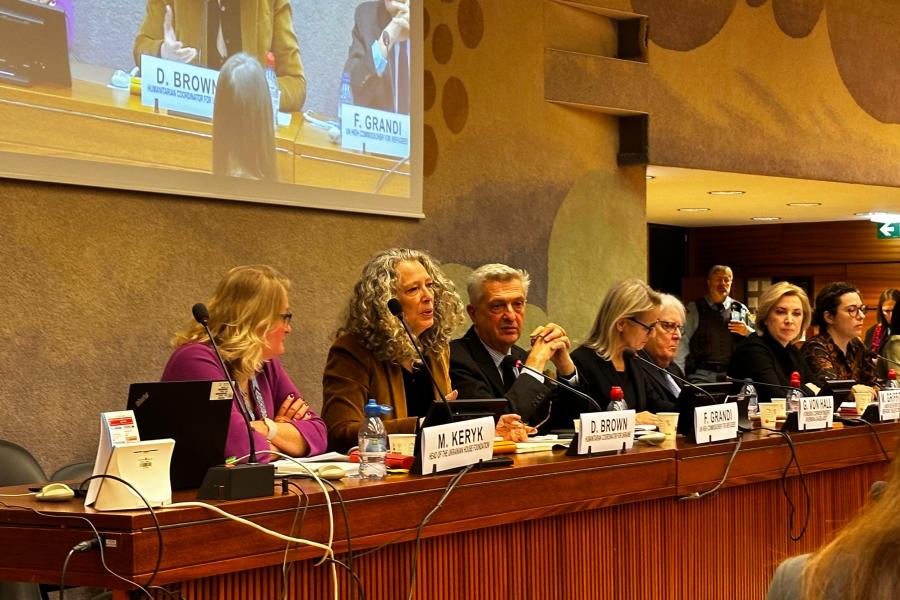THE WAR IS NOT OVER. THE SUFFERING IS NOT OVER
15 January 2024

REMARKS BY THE HUMANITARIAN COORDINATOR FOR UKRAINE, DENISE BROWN, AT THE JOINT LAUNCH OF THE HUMANITARIAN NEEDS AND RESPONSE PLAN AND REGIONAL REFUGEE RESPONSE PLAN FOR 2024 IN UKRAINE
Geneva, 15 January 2024
As delivered
I would like to take you to a place you have probably never heard of, a place which is called Hroza in the Kharkiv Region in eastern Ukraine. Hroza is a small community of 320 people, or was 320 people when on the 5 October, as people were sitting in their homes, a missile landed in the middle of that small town, killing outright 59 people and wiping out 20 per cent of the population in seconds.
Absolutely devastating and happens almost every single day in Ukraine. So, when that happens, what do we do? What do we do together? The first thing we do – what we try and do for many of these incidents – is go to those locations. The very next day we were there. I was there, UNHCR, WHO, OCHA – we were all there.
Why? Because, as the Deputy Prime Minister said, first of all, it is that demonstration of support that despite all of the other tragedies in the world right now, which look completely overwhelming, Ukraine is still important, a small community of 320 minus 59 people in seconds is still important. We go, first of all, to demonstrate that importance.
Secondly, I would like to thank OHCHR who did an excellent report on that tragic incident. It was not a military installation. It was 59 people sitting in a cafe mourning the loss of a loved one. So that's the second reason why we go – we are part of a chain.
What do we do in terms of assistance? We do just that, and it works. As the Deputy Prime Minister said, we've got a machine in place. The local authorities, local volunteers who do an outstanding job, national actors, international NGOs, UN agencies, the Government – we have got that piece set now. We respond to every one of these incidents.
On day one, we are there. What are we doing? Bringing psychosocial support and immediate supplies to start those repairs, so people whose doors and windows have been completely destroyed by this massive explosion, where the destruction left behind and the damage by the wave that destroy everything around it was bigger than this room. So, psychosocial support, our presence, our witnessing what happens and supplies – that's days after.
Weeks after, it's rebuilding the homes. In many locations, it is removing the rubble. In many locations, it is supporting small businesses because that little town depended on that little café. It was the only source of income that they had. So, all of this we can do, and it is now predictable thanks to your funding, thanks to our coordination, thanks to our network, thanks to our relationship with the authorities.
But it's the years after – and as Martin said, we are moving to the third year. There's nothing left for us to repair and there's nothing left for me to get my hands on. What's left behind is much harder to deal with. How do you get over the fact that there was, and still is, the playground of that community right beside where that café was hit. Or the women – because I was there on Christmas Day – who tell me “I don't go to the center of town anymore. I can't”. Don't forget that missiles hit and there's immediate damage. We're responding, thank you so much for your support. But in the years to come that damage that we don't see has to be dealt with. And that's the phase we're moving into.
My message is – the war is not over. The suffering is not over. We continue to require your support so that we can continue to do the job that we have been doing. And if the funding is not coming at the level that's required, you know from other locations, we will have to start dismantling the humanitarian system. And rebuilding that in Ukraine, certainly, it's not me who is going to be able to do that. So, all of these things we need to keep in mind as we move forward, but the fundamental message is – the war is not over.







